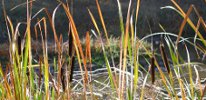
Training
Tidal Wetland Restoration Field Trip: Muzzi Marsh with Phyllis Faber
COST: FREE
REGISTRATION FOR THIS PROGRAM IS CLOSED
Contact
Grey Hayes
grey@elkhornslough.org
(831) 274-8700
Sponsors
Description
See also: Tidal Wetlands, Habitat RestorationMuzzi Marsh is one of the bay area's oldest and best monitored tidal estuary restoration projects. The restoration was begun in 1974 in Corte Madera, Marin County. After more than 25 years, the restoration of Muzzi Marsh has lots to tell us. China Camp's tidal marshes are well known as some of the most pristine in the San Francisco Bay. The marsh is often cited as a 'reference ecosystem,' helping to guide the planning and vision for many restoration sites. Field trip leaders Phyllis Faber and Phil Williams have both worked as a biological consultants for the restoration of Muzzi Marsh (and many other sites) and so were able to clearly outline the history and the context of the project. Phyllis also has been responsible for a very long term monitoring project at China Camp, which was a second stop on our field trip. The field trip discussions focused on a few main themes. First, at Muzzi Marsh, we discussed how people's expectations of a quickly successful restoration project led to some early manipulations which, luckily, had some fortuitous consequences. Participants learned about a key element of judging successful tidal marsh restoration - well developed tidal creeks - and the potential timeline for that success - 50 years. As Phyllis Faber and Phil Williams reviewed the last 30 years of Muzzi Marsh's history, participants came to understand the complexity of marsh fill (and then subsidence), varying pH, changes in soil saturation, and shifts from the original extensive pickleweed flats to more diverse cordgrass, saltgrass, and salt panne communities. Changes are still under way - Phyllis was even surprised during the field trip to see a much broadened human-made tidal channel. Conversations from Muzzi continued over lunch as we moved the trip to China Camp State Park. Participants learned that the Muzzi restoration contains many pairs of the endangered clapper rail as well as the endangered salt marsh harvest mouse. The proliferation of these endangered species alone would mean success for most tidal restoration practitioners, and so we discussed how different goals might have different timelines. As we gazed across a large tidal marsh from a hill at China Camp, Phyllis stressed the importance of the marsh to the Bay Area: it has a almost in tact, connected watershed with extensive diversity from the open tidal wetlands up to the freshwater, seasonal wetland draws. Unfortunately, most tidal marshes have been cut off from their historic drainages and the diversity inherent in the cline from ocean to freshwater no longer exists. Phyllis spoke with participants about her long term monitoring of the site and how certain species appear and disappear through time, depending on interannual climate variation. Field trip participant Stuart Siegel was kind enough to relate the deep ecological history of the extremely serpentine tidal creeks. The meandering pattern that they exhibit is now impossible to create in restoration since it is an artifact of thousands of years of geological uplift combined with tidal action and sediment deposition.
Documents and Publications
| DOCUMENT | AUTHOR / SOURCE |
|---|---|
| WORKSHOP MATERIALS | |
| Contact List: Tidal Wetland Restoration Field Trip: Muzzi Marsh with Phyllis Faber PDF, 14KB |
Elkhorn Slough Coastal Training Program September, 2006 |
| PEER-REVIEWED PUBLICATIONS | |
| Salt Marsh Restoration Experience in San Francisco Bay PDF, 876KB |
Philip Williams and Phyllis Faber Journal of Coastal Research, Special Issue No. 27, 203-311 2001 |
Links
Design Guidelines for Tidal Wetland Restoration in San Francisco Bay
http://www.wrmp.org/design/
Wetlands Mitigation: Reflections on a Hazardous Road
http://www.coastalconservancy.ca.gov/coast&ocean/winter2000/pages/pthr.htm
Questions and Answers
Submit a question on this subject and we'll provide an answer. coastaltraining@elkhornsloughctp.org

